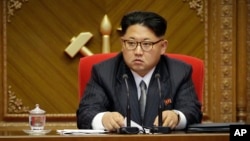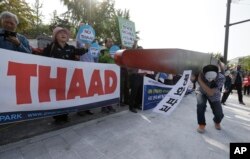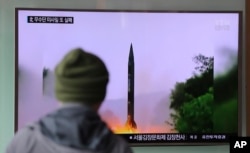After winning the U.S. presidential election, President-elect Donald Trump has tried to reassure allies in Northeast Asia that are apprehensive at the possibility he may follow through on the radical policy changes he suggested during the campaign.
Japanese Prime Minister Shinzo Abe spoke to the president-elect to stress the need for close cooperation between their two nations to maintain peace and stability in Asia, according to an official in Tokyo. Abe is also planning to meet with Trump in November before traveling to the Asia-Pacific Economic Cooperation (APEC) summit in Peru.
During a phone call with South Korean President Park Geun-hye on Thursday, the U.S. president-elect said, “We are with you all the way, and we will not waver,” according to a statement from the Seoul presidential office.
Burden sharing
During the presidential campaign, the Republican nominee refused to say if he would unconditionally support the longstanding U.S. extended deterrence policy to defend allies in Asia against a North Korean nuclear attack.
Instead, he voiced sharp criticism of South Korea and Japan for not bearing enough of the financial burden for American forces stationed in their countries. And Trump threatened to pull out troops and allow regional allies to acquire their own nuclear weapons if they could not come to better financial terms.
The South Korean Defense Ministry said Thursday the division of defense costs from their perspective is fair and has been determined by negotiations that included the current U.S. administration, the U.S. forces in Korea and Congress.
Nor is Seoul willing to pay for the U.S. missile defense system THAAD to be deployed in Korea, said Defense Ministry Spokesman Moon Sang-kyun.
“We already have expressed many times that we are not willing to purchase it. THAAD has been already decided between the administrations of South Korea and the U.S., and is proceeding normally, so we judge that there will be no such problem,” he said.
North Korea
North Korean state media has urged Trump to help unify the Korean peninsula by withdrawing American forces from South Korea. During the campaign, Trump indicated he would consider this option if Washington and Seoul could not agree on a fairer burden-sharing agreement.
An editorial about Trump appeared in the DPRK Today state media outlet. It also called him a “wise politician” and “far-sighted presidential candidate.”
The president-elect’s perceived willingness to consider an unconventional approach to regional security in Asia may create new possibilities for negotiations that have stalled over the North’s repeated nuclear and missile tests, the U.S.-led efforts to increase sanctions against Pyongyang, and China’s reluctance to impose harsh measures that might cause instability at its border or the collapse of its ally.
But North Korea analyst Van Jackson says it also comes with risk, as the North could read any friction among U.S. allies as a lack of resolve.
“They see the lack of certainty about us coming to South Korea’s aid, and that could translate into a window of opportunity in their minds,” said Jackson, who is an associate professor at the U.S. Defense Department’s Asia-Pacific Center for Security Studies in Honolulu, but his views do not represent the positions of the U.S. government.
Possible negative outcomes of a U.S. withdrawal from the region, Jackson says, would include North Korea staging an attack against the South, China increasing its power in Asia, and the U.S. suffering from reduced influence and trade in the region.
In January, Trump called North Korean leader Kim Jong Un a “maniac” but gave the young leader credit for ruthlessly seizing power. At the same time he emphasized that the U.S. must be tough in dealing with any provocations, saying, “This guy doesn’t play games. And we can’t play games with him.”
But on how to deal with the growing North Korean threat, Trump has been vague other than to say he would be willing to meet with the North Korean leader over a hamburger.
While Trump has opened up the possibly for radical change with his comments, some leaders in his party, such as Senator John McCain, have tried to reassure allies in the region that the U.S. would fulfill its security commitment to Asia and maintain the current North Korea policy that focuses on deterrence, containment and increasing pressure on the Kim government to halt its nuclear program.
But on Thursday, the Rodong Sinmun, the official newspaper of the ruling Workers’ Party, reaffirmed Pyongyang’s position that it will never give up its nuclear weapons saying, “Washington’s hope for North Korea’s denuclearization is an outdated illusion.”
Human rights
President-elect Trump, who has expressed admiration for some authoritarian leaders, such as Russia’s Vladimir Putin, has not yet addressed international efforts to hold North Korean leaders accountable for widespread and systematic human rights abuses.
In 2014, a U.N. Commission of Inquiry on human rights in North Korea issued a report documenting a network of political prisons in the country holding 120,000 people and a list of atrocities that include “forced labor, torture, imprisonment, rape, forced abortions and other sexual violence.”
Pyongyang’s allies, China and Russia, have reportedly put on hold a U.N. Security Council measure to refer North Korea to the International Criminal Court for crimes against humanity.
Phil Robertson, the deputy Asia director of the advocacy group Human Rights Watch says he is concerned that the president-elect will overlook rights abuses in the North to achieve some concession from Pyongyang on its nuclear program.
“We are going to have to work on Donald Trump. We are going to have to push him very hard on human rights issues” he said.
Youmi Kim in Seoul contributed to this report.







